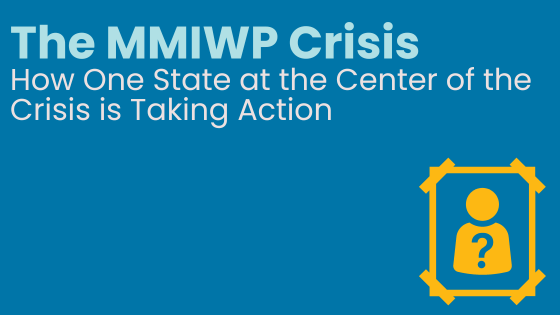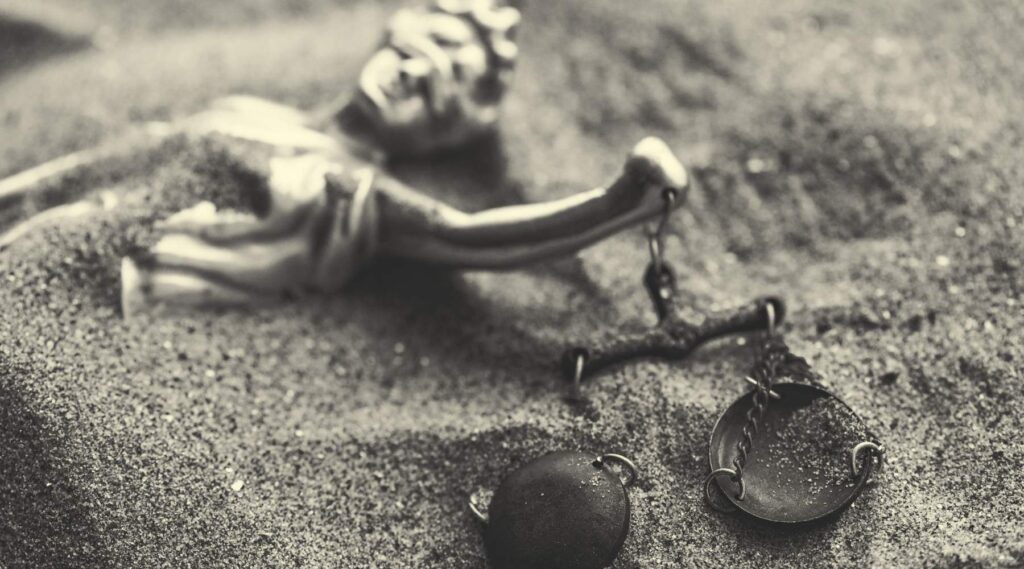Today’s guest blog is written by Jordan Nutting, Promega. Reposted from the ISHI Report with permission.
In April 2023, the Washington State Attorney’s General Office inaugurated a specialized cold case unit. The purpose of the new unit is to provide specialized assistance to local and tribal law enforcement agencies to solve cold cases involving murdered and missing Indigenous women and people (MMIWP) (1,2). Signed into law with unanimous support in the state legislature, this unit is the first of its kind in the United States and was conceived by a task force dedicated to addressing the crisis of MMIWP in the state of Washington (3).
Though many states have implemented task forces focused on MMIWP (4), the Washington State MMWIP Task Force has made notable progress in crafting actionable recommendations for addressing the crisis and in gathering support needed to see those recommendations turned into real policies, laws and results. As efforts continue throughout the United States to address the MMIWP crisis, we wanted to highlight some of the progress the Washington State MMWIP Task Force and its partners are making.
The MMIWP Crisis
In the United States, Indigenous women face the highest rates of violence compared to any other group. According to data collected by the US Department of Justice:
- In some US counties, the murder rates of Indigenous women are ten times the national average (5).
- Indigenous women are almost three times as likely to experience rape or sexual assault compared to white, Black or Asian women (5).
- Most violent acts against Indigenous people are committed by non-Indigenous perpetrators (6).
Grassroots advocacy efforts and recent documentary films Say Her Name and Somebody’s Daughter (1492– ) have brought broader public attention to the depth of this crisis (7,8).
Washington is one of the states at the epicenter of the MMIWP crisis. A 2018 report from the Urban Indian Health Institute listed Washington as one of the states with the highest number of MMIWP cases (9). A 2019 report from the same agency found that in Washington, Indigenous women go missing at four times the rate as white women (10). As of July 27, 2022, there were 10,535 homicides registered in Washington’s Homicide Investigation Tracking System. Of those homicides, 4.14% had Indigenous victims, despite Indigenous people only made up about 1.9% of Washington’s population. Similarly, 4.98% of the state’s unsolved homicides involved an Indigenous victim (4).
These data point to the disproportionate violence faced by Indigenous communities.
The Washington State MMIWP Task Force
In December 2021, Washington Attorney General Bob Ferguson assembled a task force “to understand and address the systemic causes of violence against Indigenous people.” (4) The Washington State MMIWP Task Force is made up of a diverse group including state representatives and senators, tribal leaders, advocates and law enforcement officials. Since the inception of the task force, their activities have centered around public meetings, talking circles, public comment sessions and subcommittee meetings with the aim that community members and those impacted by the MMIWP crisis can share their perspectives and stories. Since its inception, the task force has published two interim reports, each containing several recommendations aimed to “understand and address the systemic causes of violence against Indigenous people” (4,11).
A Statewide Alert System
After its inception, the first major achievement for the task force was the creation of a Missing Indigenous Person Alert, which was signed into Washington state law in 2022 (11). The alert system was recommended by the Washington State MMIWP Task Force in their 2022 interim report and was implemented July 2022. The alert operates like the national AMBER or Silver alerts, which have proven successful in locating missing children and elderly persons. Washington’s Missing Indigenous Person Alert is the first alert for missing Indigenous people in the United States.
According to an update from the task force’s 2023 interim report: “As of October 27, 2023, a total of 72 missing Indigenous person alerts were issued, and 65 of the individuals were located. Tragically, two individuals were found deceased.” The AG office is working with other states to implement similar systems, and the 2023 interim report from the task force recommends implementing a similar federal system that would operate statewide.
A Toolkit for Missing Persons’ Families
In April 2023, Washington governor Jay Inslee signed House Bill 1512 into law. This law requires the state to develop and share an online toolkit that will help families navigate how to report a missing person and work with law enforcement (12). The toolkit was another recommendation published in the task force’s 2022 interim report and could be particularly helpful for Indigenous families who want to report a missing person but who are unsure of how to navigate the intersection of state, federal and tribal jurisdictions. According to the text of HB 1512, the toolkit is required to include information “specifically tailored to reporting and recovering missing Indigenous women and persons.”
A MMIWP Cold Case Unit
In their 2022 report, the Washington State MMIWP Task Force recommended that “[t]he Legislature should establish and fully fund a Cold Case Investigation Unit within the Attorney General’s Office with a focus on MMIWP cold cases” (4). This recommendation stemmed from the recognition that Indigenous victims are over-represented in homicide and missing person cases in Washington. The unit’s mission would be to provide focused expertise and resources to solve cold cases involving MMIWP and work with other state and tribal authorities who have jurisdiction in the cases.
In 2023, the unit was established by unanimous passage in the Washington State Legislature (3). Attorney General Ferguson later appointed Brian George to lead the unit. George is a 27-year law enforcement veteran, a member of the Washington State MMIWP Task Force and enrolled member of the Port Gamble S’Klallam Tribe.
Though the unit is still being formed, it has already achieved a major milestone: it received $1.5 million from the federal Emmett Till Cold Case Investigations and Prosecution Grant—the largest amount awarded by this grant program and twice what was originally requested (13). The funding will be used to hire two case navigators who will stay in regular contact with families tied to MMWIP investigations and provide them with updates and information from the investigators.
Latest Recommendation: More Funding for DNA Analysis and Forensic Genetic Genealogy
The Washington State MMIWP Task Force published their second interim report in December 2023, which included a recommendation to “increase state funding for DNA testing and forensic genetic genealogy of unidentified remains” (11).
When the 2023 report was published, there were 163 unidentified human remains in Washington, most of which had fingerprint and dental records, according to the report. Though DNA analysis would typically be carried out for many of these remains, reduced funding during the COVID-19 pandemic halted testing until the spring of 2022. Consequently, the state had not yet managed to address this backlog. To aid identification of these remains, the Washington State MMIWP Task Force recommended a one-time funding increase to help the Washington medical examiner’s office catch up on DNA testing and to carry out forensic genetic genealogy (FGG), also known as investigative genetic genealogy, testing where no match with the DNA profile in CODIS is found. The recommendation includes a one-time funding increase to address this backlog as well as sustained funding to better meet future testing needs.
FGG uses public genetic genealogy databases to identify familial connections between unidentified remains and individuals who have uploaded their genetic information to those databases. DNA profile matches identified through CODIS only include immediate family members, such as parents or siblings. FGG, though more complex, can identify familial relationships several times removed, and can help widen the search.
DNA matching and FGG analysis have proven successful in identifying missing Indigenous people (15).
Not all the unidentified human remains in Washington necessarily belong to Indigenous persons, but DNA testing and FGG analysis can help identify if any of the remains belong to missing Indigenous persons and provide answers to their families. No updates are available yet on whether the task force’s recommendation to better fund genetic analyses of unidentified remains will become a reality.
Next Steps
Over the next year, the Washington State MMIWP Task Force will continue meeting and hosting listening sessions to hear from people who have been impacted by the MMIWP crisis. The task force is budgeted to continue through to June 2025 and will release its third and final report at that time (11).
The disproportionate violence faced by Indigenous women and people today is an extension of centuries of racist and assimilationist policies (7,8). Though the efforts of the Washington State MMIWP Task Force alone will not be sufficient to undo or solve the crisis of MMIWP in the state, its efforts and actions are a key step to improving Indigenous person’s access to justice.
WOULD YOU LIKE TO SEE MORE ARTICLES LIKE THIS? SUBSCRIBE TO THE ISHI BLOG BELOW!
SUBSCRIBE NOW!
References
1. For a note on terminology, see: https://americanindian.si.edu/nk360/informational/impact-words-tips (accessed Feb. 2, 2024)
2. Yoon-Hendricks, A. (2023, April 21). WA launches cold case unit for missing and murdered Indigenous people. The Seatle Times. https://www.seattletimes.com/seattle-news/politics/wa-launches-cold-case-unit-for-missing-and-murdered-Indigenous-people/
3. Washington State Office of the Attorney General. (2023, November 6). Chief investigator hired to lead AG Ferguson’s Missing and Murdered Indigenous Women and People Cold Case Unit [Press release]. Retrieved from https://www.atg.wa.gov/news/news-releases/chief-investigator-hired-lead-ag-ferguson-s-missing-and-murdered-Indigenous
4. Washington State Missing and Murdered Indigenous Women and People Task Force. (2022) 2022 Interim Report of the Washington State Missing and Murdered Indigenous Women and People (MMIWP) Task Force. Retrieved from https://www.atg.wa.gov/washington-state-missing-and-murdered-Indigenous-women-and-people-task-force
5. Bachman, R, et al. (2008) Violence Against American Indian and Alaska Native Women and the Criminal Justice Response: What is Known. https://www.ojp.gov/pdffiles1/nij/grants/223691.pdf
6. Rosay, A. B. (2016) Violence Against American Indian and Alaska Native Women and Men: 2010 Findings from the National Intimate Partner and Sexual Violence Survey. National Institute of Justice. https://www.ojp.gov/pdffiles1/nij/249736.pdf
7. Rain (2021) Somebody’s Daughter (1492‒ ). Alter-Native Media. https://www.somebodysdaughter.com/somebodys-daughter-the-film
8. Rain (2021) Say Her Name. https://www.somebodysdaughter.com/say-her-name-the-film
9. Urban Indian Health Institute. (2018). Missing Murdered Indigenous Women & Girls: A Snapshot of Data from 71 Urban Cities in the United States. https://www.uihi.org/resources/missing-and-murdered-Indigenous-women-girls/
10. Echo-Hawk, A., Dominguez, A., Echo-Hawk, L. (2019). MMIWG: We Demand More. Urban Indian Health Institute. https:// www.uihi.org/resources/mmiwg-we-demand-more/
11. Washington State Missing and Murdered Indigenous Women and People Task Force. (2023) 2023 Interim Report of the Washington State Missing and Murdered Indigenous Women and People (MMIWP) Task Force. Retrieved from https://www.atg.wa.gov/washington-state-missing-and-murdered-Indigenous-women-and-people-task-force
12. Gallup, L. (2023, May 1) New online toolkit to provide help, comfort to families with missing loved ones. Northwest Public Broadcasting. https://www.nwpb.org/2023/05/01/new-online-toolkit-to-provide-help-comfort-to-families-with-missing-loved-ones/
13. Taylor, M. (2023, December 6) Largest-ever Emmett Till Grant Supports Washington’s Newest Cold Case Unit. Forensic. https://www.forensicmag.com/609297-Largest-ever-Emmitt-Till-Grant-Supports-Washington-s-Newest-Cold-Case-Unit/
14. For an example, see: https://dnadoeproject.org/case/kern-co-jane-doe/




